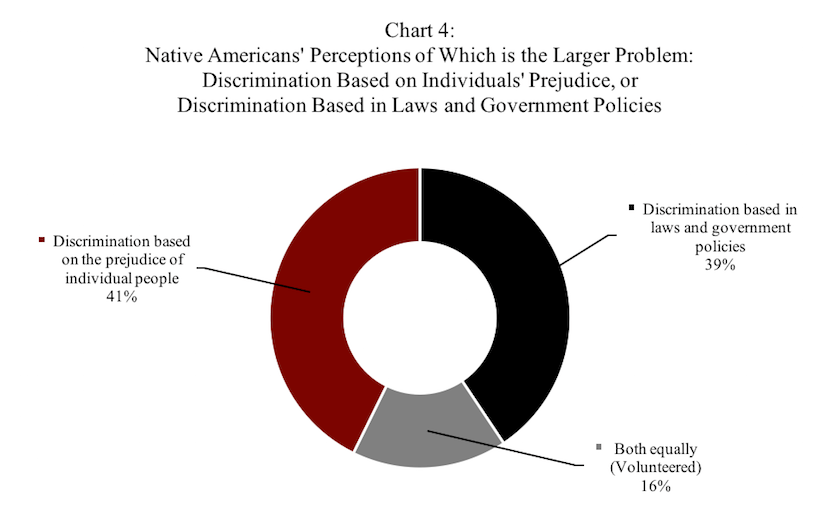November 14, 2017 – This report is part of a series titled “Discrimination in America.” The series is based on a survey conducted for National Public Radio, the Robert Wood Johnson Foundation, and Harvard T.H. Chan School of Public Health. While many surveys have explored Americans’ beliefs about discrimination, this survey asks people about their own personal experiences with discrimination.
More than one in three Native Americans report experiences of slurs, offensive comments, threats or harassment, and violence
In the context of individual or interpersonal forms of discrimination, Native Americans report significant experiences of offensive comments, slurs, violence, threats, and harassment. Chart 1 shows that 35% of Native Americans report personally experiencing slurs and 39% report insensitive or offensive comments specifically about their race or ethnicity.
Additionally, 38% of Native Americans say they or a family member have experienced violence because they are Native, with 34% also saying they have been threatened or non-sexually harassed because they are Native. Nearly one-quarter (23%) say they or a family member have been sexually harassed (Chart 1).

Robert Blendon, co-director of the survey and the Richard L. Menschel Professor of Health Policy and Political Analysis at Harvard T.H. Chan School of Public Health, says, “Often when people talk about discrimination, they talk about unfair practices at work or in their professional lives. Though our poll certainly shows many work-related experiences of discrimination, this poll also highlights the extraordinary level of personal experiences of violence and harassment facing Native Americans and their families today.”
Nearly one in three Native Americans say they have personally experienced anti-Native discrimination in the workplace or when interacting with police
Chart 2 shows the overall reporting of perceived experiences of discrimination in each area.
Nearly one-third of Native Americans report being personally discriminated against because they are Native when it comes to being paid equally or considered for promotion (33%), applying for jobs (31%), and when interacting with the police (29%) (Chart 2).

Nearly one in four Native Americans say they have experienced discrimination when going to a doctor
In the context of health care, 23% of Native Americans say they have been personally discriminated against because they are Native when going to a doctor or health clinic (Chart 2).
Additionally, 15% of Native Americans say they have avoided seeking medical care for themselves or a member of their family out of concern they would be discriminated against or treated poorly because they are Native.
Native Americans living in majority-Native areas are significantly more likely to report discrimination when interacting with police, in the workplace, and when voting
Native Americans who described the area where they live as a predominantly Native American area are significantly more likely to say they have been personally discriminated against, compared to Native Americans living in self-described non-majority Native areas.
Chart 3 shows that Native Americans in majority Native areas are more than three times as likely (55%) as those in non-majority Native areas (16%) to say they have been personally discriminated against because they are Native when interacting with police.

In the workplace – both when applying for jobs and when it comes to being paid equally or considered for promotions – they are more than twice as likely (54%) as those living in non-majority Native areas (22%) to say they have faced anti-Native discrimination (Chart 3).
Additionally, Native Americans living in majority Native areas are more than five times as likely (23%) as those living in non-majority Native areas (4%) to report being discriminated against when trying to vote or participate in politics (Chart 3).
Native Americans are equally divided over whether individuals’ prejudice or laws and government policies are the bigger problem for discrimination against Native people today
Overall, 75% of Native Americans believe that discrimination against Native people exists in America today. Those who believe discrimination exists were asked: “When it comes to discrimination against Native Americans in America today, which do you think is the bigger problem? Discrimination that is based in laws and government policies, or discrimination that is based on the prejudice of individual people?”
Native Americans are roughly evenly split: 41% say discrimination based on individuals’ prejudice is a bigger problem, while 39% say it is discrimination based in laws and government policies. Another 16% say that both forms of discrimination are equally a problem (Chart 4).

Survey Background
The survey was conducted January 26 – April 9, 2017, among a nationally representative, probability-based telephone (cell and landline) sample of 3,453 adults age 18 or older. The survey included nationally representative samples of African Americans, Latinos, Asian Americans, Native Americans, as well as white Americans; men and women, and LGBTQ adults. This report presents the results specifically for a nationally representative probability sample of 342 Native American U.S. adults. Other reports analyze each of the other groups, and the final report will discuss major highlights from the series.
Respondents were asked what race or races they consider themselves to be, one category being “American Indian or Alaska Native” (AI/AN). Separately, respondents were asked if they were of Hispanic or Latino background. If they identified only as AI/AN, they were included in the Native American sample. If they identified as more than one race, or said they were both AI/AN and Hispanic or Latino, they were asked with which they more identified. If they said they identified more with AI/AN, they were included in the Native American sample.
For more information:
Todd Datz
617.432.8413
tdatz@hsph.harvard.edu
Visit the Harvard Chan School website for the latest news, press releases, and multimedia offerings.
###
Harvard T.H. Chan School of Public Health brings together dedicated experts from many disciplines to educate new generations of global health leaders and produce powerful ideas that improve the lives and health of people everywhere. As a community of leading scientists, educators, and students, we work together to take innovative ideas from the laboratory to people’s lives—not only making scientific breakthroughs, but also working to change individual behaviors, public policies, and health care practices. Each year, more than 400 faculty members at Harvard Chan School teach 1,000-plus full-time students from around the world and train thousands more through online and executive education courses. Founded in 1913 as the Harvard-MIT School of Health Officers, the School is recognized as America’s oldest professional training program in public health.
